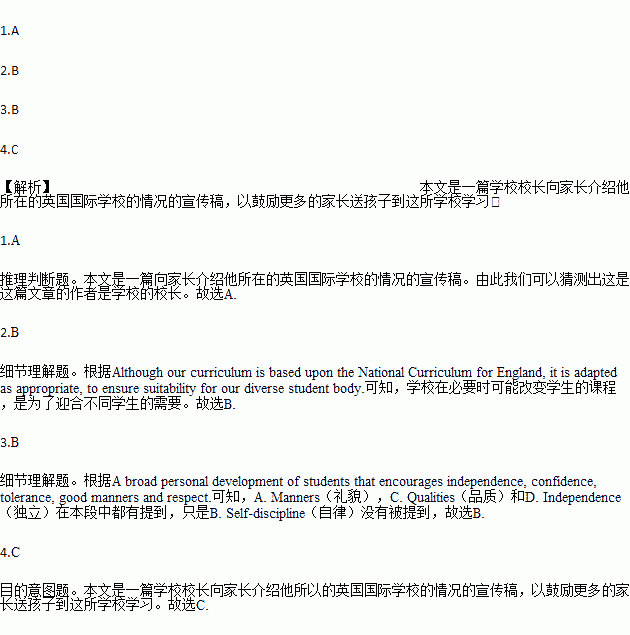题目内容
Dear Parents:
I’m delighted that you are considering the British International School for your children’s education. Our school offers first class international education delivered by experienced, highly qualified and professional staff.
We aim to provide a high quality British-style education characterized by:
The arrangement of the English National Curriculum to meet the needs of international and local students and offering an insight into the local culture.
High quality teaching provided by international and local staff.
A broad personal development of students that encourages independence, confidence, tolerance, good manners and respect.
A recognition of the school-parent partnership in the successful education of the children.
An acknowledge that all students are individuals who deserve an environment to help realize their academic and other potential, thereby preparing them for their chosen continued education and career.
A safe, caring, happy and stimulating environment benefiting from high quality facilities.
Our school provides an effective framework for education through a broad, balanced, and monitored curriculum. As students advance through the school, we ensure that their needs are met through progressive teaching and learning. Although our curriculum is based upon the National Curriculum for England, it is adapted as appropriate, to ensure suitability for our diverse student body. Thus, we strive for the development of transferable skills through the years of school, as well as the acquisition of a broad body of knowledge.
Students are given opportunities to develop many skills. These include skills in language, in science, technology and mathematics, in the aesthetic(审美的) and creative fields of music, drama and art, and in physical education.
We insist that students act in a responsible manner toward all members of society. Throughout the school, students are taught to distinguish between right and wrong and show consideration for others. The qualities of honesty, kindness and good manners are always encouraged. Our friendly atmosphere provides a secure and happy environment in which children can grow and flourish as Individuals and valued members of the school family.
1.What do you think the author is?
A. A school principal
B. An exchange student.
C. An assistant professor
D. An experienced lecturer.
2.Why does the school change its curriculum when necessary?
A. To develop some good students’ skills.
B. To meet the needs of different students.
C. To offer an insight into the local culture.
D. To help students realize their potential.
3.Which of the following about the students is NOT mentioned in the passage?
A. Manners
B. Self-discipline
C. Qualities.
D. Independence.
4.What is the purpose of the passage?
A. The author thinks schools and parents play an important role in teaching.
B. The author is stressing that responsibility is the most important thing for a student.
C. The author is encouraging more parents to send their children to this school.
D. The author implies students become valued people without a friendly atmosphere.
 53随堂测系列答案
53随堂测系列答案

 ),并在其下面写出该加的词。
),并在其下面写出该加的词。